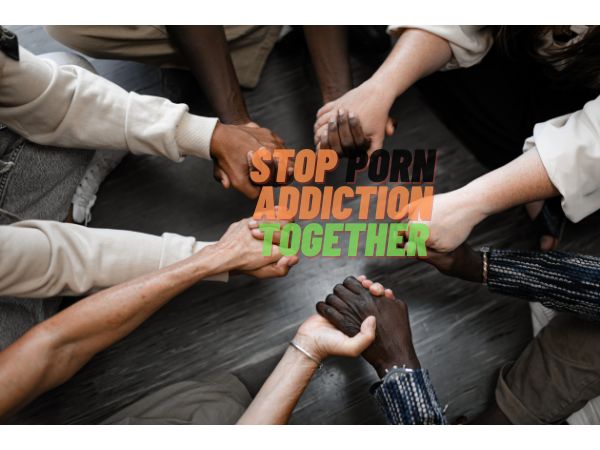In a country where the internet is as American as apple pie, the question of whether diving into the world of adult content is normal sparks heated debates. Buckle up, readers, as we take you on a rollercoaster ride through the twists and turns of po*n addiction and expert insights that will make you rethink what’s considered “normal.”
Netflix Can’t Compete: The Digital Escape Hatch of Porn
A recent study in by the Pew Research Center reveals that 70% of Americans have encountered pornography at least once in their lives, showcasing the prevalence of explicit content in the digital era.

Escaping the mundane? A whopping 65% of adults admit to using pornography as a stress-relief mechanism, turning the virtual world into a refuge from the chaos of everyday life.
Millennials and Gen Z, the torchbearers of the digital age, are more likely to explore explicit content, with over 75% acknowledging exposure at some point, according to a survey conducted by the American Psychological Association.
Mind-Blown Science: How Your Brain Becomes a Pleasure Junkie
Hold on to your hats! A 2019 study published in JAMA Psychiatry suggests a correlation between frequent porn use and changes in the brain similar to those seen in substance addiction.
Dopamine, the brain’s pleasure powerhouse, takes center stage. The American Society of Addiction Medicine reports that the release of dopamine during explicit content consumption creates a chemical reward system, making the brain crave more, leading to potential desensitization.
Can’t get enough? The Kinsey Institute highlights that individuals may find themselves seeking more extreme content over time to maintain the same level of arousal, creating a dangerous cycle.
Love, Lust, and Pixels: Porn’s Impact on American Relationships
Relationships are feeling the heat! A survey by the National Marriage Project found that couples where one partner consumes porn frequently are more likely to experience relationship dissatisfaction and instability.
Unrealistic expectations alert! The American Psychological Association notes that consistent exposure to explicit content can create unrealistic standards for physical appearance and sexual performance, potentially causing strain in intimate relationships.
A University of Oklahoma study suggests that while some couples use explicit content to enhance their relationships, excessive use can lead to emotional dissatisfaction and communication breakdown.
The Internet’s Dark Alley: How Accessibility Fuels the Fire
Accessibility at its peak! A report from the Internet Watch Foundation estimates that over 12% of all websites are dedicated to explicit content, making it just a click away for anyone with an internet connection.
The American Academy of Pediatrics warns that the lack of age restrictions and the ease of access to explicit content contribute to early exposure, influencing sexual attitudes and behaviors in adolescents.
A University of Montreal study found that 90% of boys and 60% of girls have been exposed to explicit content before the age of 18, highlighting the urgent need for discussions on responsible consumption.
Psychoanalysis 101: What is really Driving Your Addiction?
An identity crisis? The Journal of Sex & Marital Therapy suggests that individuals may turn to explicit content as a way to cope with issues related to identity, body image, and self-esteem.
Seeking solace? According to the American Psychological Association, those with pre-existing mental health conditions, such as anxiety and depression, may be more susceptible to using explicit content as a form of self-medication.
A Psychology Today article emphasizes the importance of addressing the root causes, urging individuals to seek professional help for underlying psychological issues rather than relying solely on self-medication.
Expert Insights: The Red, White, and Blue Debate – Is Watching Porn Normal?
Bible Belt vs. Silicon Valley: A Gallup Poll reveals a stark divide in attitudes toward pornography consumption, with conservative states expressing more disapproval compared to their liberal counterparts.
According to a survey by the American Family Association, 60% of evangelicals believe that pornography is morally wrong, while a Pew Research Center study shows that 73% of non-religious Americans view it as morally acceptable.
Cultural clashes? A study by the Journal of Sex Research highlights the influence of cultural background, with varying views on the acceptability of explicit content across diverse communities in the United States.
Addiction control 2025- How to stop P**n addiction in 2025
Recovery is possible, and with the right resources and a strong support network, individuals can break free from the grips of porn addiction and reclaim a healthier, more fulfilling life.
Hold onto your hats, America!
This blog is your all-access pass to the unfiltered truth about p**n addiction, backed by eye-opening data and expert insights. From suburban living rooms to city skyscrapers, let’s break taboos, embrace real talk, and redefine what’s “normal” when it comes to sexuality in the good ol’ U.S. of A.
Is watching p**nography considered normal in the United States?
The acceptability of watching p**nography in the United States varies, influenced by cultural, religious, and personal values. Studies highlight significant exposure, prompting diverse individual attitudes.
Are there psychological factors contributing to porn addiction in America?
Indeed, underlying psychological factors, including anxiety and depression, may drive individuals to use explicit content as a form of self-medication. Addressing these root causes is essential for holistic recovery.
How can individuals break free from porn addiction?
Breaking free involves fostering self-awareness, seeking professional help, and developing healthy coping mechanisms. Acknowledging the issue and exploring alternative stress coping strategies are crucial steps.
How can we encourage a healthy dialogue about porn addiction in American society?
Encouraging a healthy dialogue involves breaking down taboos surrounding the topic. Open discussions, providing accurate information, and education can empower individuals to make informed choices about their sexuality

